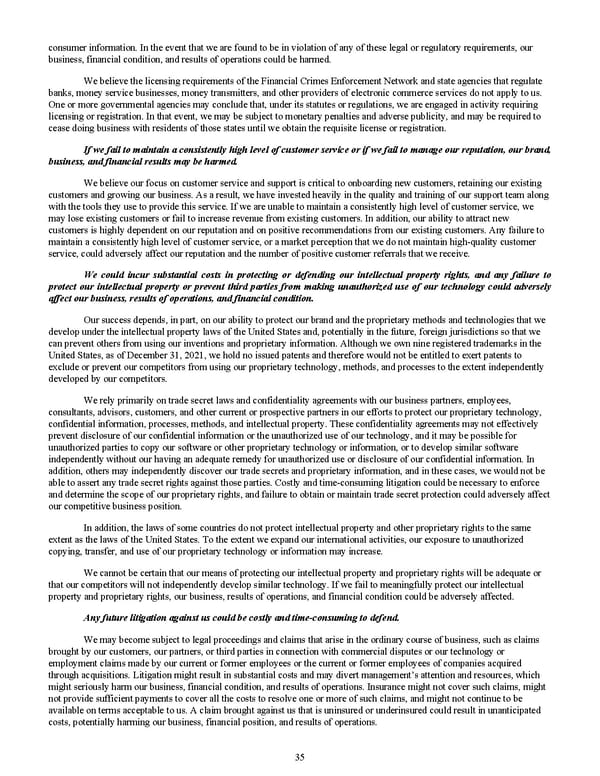consumer information. In the event that we are found to be in violation of any of these legal or regulatory requirements, our business, financial condition, and results of operations could be harmed. We believe the licensing requirements of the Financial Crimes Enforcement Network and state agencies that regulate banks, money service businesses, money transmitters, and other providers of electronic commerce services do not apply to us. One or more governmental agencies may conclude that, under its statutes or regulations, we are engaged in activity requiring licensing or registration. In that event, we may be subject to monetary penalties and adverse publicity, and may be required to cease doing business with residents of those states until we obtain the requisite license or registration. If we fail to maintain a consistently high level of customer service or if we fail to manage our reputation, our brand, business, and financial results may be harmed. We believe our focus on customer service and support is critical to onboarding new customers, retaining our existing customers and growing our business. As a result, we have invested heavily in the quality and training of our support team along with the tools they use to provide this service. If we are unable to maintain a consistently high level of customer service, we may lose existing customers or fail to increase revenue from existing customers. In addition, our ability to attract new customers is highly dependent on our reputation and on positive recommendations from our existing customers. Any failure to maintain a consistently high level of customer service, or a market perception that we do not maintain high-quality customer service, could adversely affect our reputation and the number of positive customer referrals that we receive. We could incur substantial costs in protecting or defending our intellectual property rights, and any failure to protect our intellectual property or prevent third parties from making unauthorized use of our technology could adversely affect our business, results of operations, and financial condition. Our success depends, in part, on our ability to protect our brand and the proprietary methods and technologies that we develop under the intellectual property laws of the United States and, potentially in the future, foreign jurisdictions so that we can prevent others from using our inventions and proprietary information. Although we own nine registered trademarks in the United States, as of December 31, 2021, we hold no issued patents and therefore would not be entitled to exert patents to exclude or prevent our competitors from using our proprietary technology, methods, and processes to the extent independently developed by our competitors. We rely primarily on trade secret laws and confidentiality agreements with our business partners, employees, consultants, advisors, customers, and other current or prospective partners in our efforts to protect our proprietary technology, confidential information, processes, methods, and intellectual property. These confidentiality agreements may not effectively prevent disclosure of our confidential information or the unauthorized use of our technology, and it may be possible for unauthorized parties to copy our software or other proprietary technology or information, or to develop similar software independently without our having an adequate remedy for unauthorized use or disclosure of our confidential information. In addition, others may independently discover our trade secrets and proprietary information, and in these cases, we would not be able to assert any trade secret rights against those parties. Costly and time-consuming litigation could be necessary to enforce and determine the scope of our proprietary rights, and failure to obtain or maintain trade secret protection could adversely affect our competitive business position. In addition, the laws of some countries do not protect intellectual property and other proprietary rights to the same extent as the laws of the United States. To the extent we expand our international activities, our exposure to unauthorized copying, transfer, and use of our proprietary technology or information may increase. We cannot be certain that our means of protecting our intellectual property and proprietary rights will be adequate or that our competitors will not independently develop similar technology. If we fail to meaningfully protect our intellectual property and proprietary rights, our business, results of operations, and financial condition could be adversely affected. Any future litigation against us could be costly and time-consuming to defend. We may become subject to legal proceedings and claims that arise in the ordinary course of business, such as claims brought by our customers, our partners, or third parties in connection with commercial disputes or our technology or employment claims made by our current or former employees or the current or former employees of companies acquired through acquisitions. Litigation might result in substantial costs and may divert management’s attention and resources, which might seriously harm our business, financial condition, and results of operations. Insurance might not cover such claims, might not provide sufficient payments to cover all the costs to resolve one or more of such claims, and might not continue to be available on terms acceptable to us. A claim brought against us that is uninsured or underinsured could result in unanticipated costs, potentially harming our business, financial position, and results of operations. 35
 2022 10K Page 41 Page 43
2022 10K Page 41 Page 43